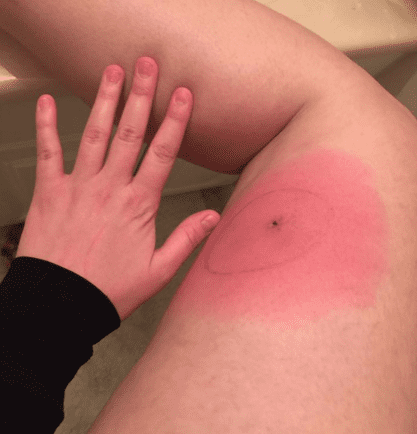
When it's cold outside, you may find your house turning into a spider habitat. These cold-blooded, eight-legged creatures move to warmer spaces (like your closets) to find relief from the cold.
But if you find some sort of bump on your arm, don't assume it's a spider bite. Research found that even doctors frequently misdiagnose 40 possible conditions (including herpes, Lyme disease and skin cancer) as brown recluse spider bites - a very common and very false diagnosis.
Lumps and lesions are often blamed on spiders, when that's just not the case. While only10 percent of spider bites require medical attention, the real danger comes when your doctor diagnoses your skin cancer as a harmless spider bite.
Know the difference between a brown recluse bite, skin cancer or another condition so you can receive proper medical attention.
How to tell if it's just a spider bite
JAMA Dermatology created a mnemonic device to help you diagnose whether it is a brown recluse bite or a more serious wound. NOT RECLUSE stands for things that would not be a factor if bitten by a brown recluse:
NOT RECLUSE
Numerous: More than one injury
Occurrence: Not received in a secluded area like a box or closet
Timing: Occurred between November to March
Red center: Center of the "bite" is red
Elevated: Middle is elevated, not sunken
Chronic: Wound remained for more than three months
Large: Wound is greater than 10 centimeters wide
Ulcerates too early: Wound's surface appears crusty within the first week
Swollen: Wound swells and enlarges below the neck
Exudative: Appears wet from pus or clear fluids oozing from the wound
In case of a spider bite
Use this checklist to determine the difference between a spider bite or something more serious. Having more than two of these symptoms would exclude a spider bite and suggest another condition.
People often diagnose their own skin conditions as spider bites because of shame from the unappealing appearance of the condition, says Rick Vetter, a retired entomologist of the University of California, a brown recluse expert and a co-author of the mnemonic device.
If you question the seriousness of a wound, please seek medical attention immediately. Do not ignore a lump or lesion that could cause serious health risks.
"When we see people with cancer... who get this false diagnosis," Vetter says, "it really drives home that you can't just call everything a recluse bite."
In serious spider bite cases, the Centers for Disease Control and Prevention recommends bringing the spider with you when seeking medical attention. They will be able to identify the species of spider, hypothesize the effects the bite will have on you and conclude your course of treatment.

